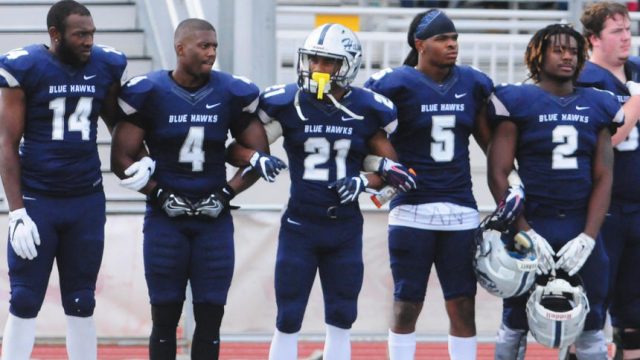Is This North Dakota’s First National Anthem Protest?

Unless I’ve missed something, I believe this group of Dickinson State University football players who linked arms before their game this weekend is the first protest during the national anthem from athletes that North Dakota has seen.
And to their credit, the players were respectful about it. More so, I think, thank 49’ers quarterback Colin Kaepernick and some others:
The idea to link arms, which originated with Sterling and Boone, according to Boone, was a compromise between kneeling and doing nothing, and was an attempt to show solidarity with the protest without causing what some might see as disrespect.
“We felt like we wanted to stand up for ourselves, in a respectful way. We didn’t want to take a knee or nothing, but we still wanted to make it known that we’re with that movement,” Lindsey said. “In my eyes, there’s nothing wrong with it. People have freedom of speech. Honestly, the stuff that’s going on around the world, it seems wrong to me. We live in a crazy world. That’s why I’m doing it. I’m not doing this because I’m this color and I feel like I’m being disrespected. I’m doing it because we’re all having to deal with this.”
All but one of the players are from California except Mack, who is from Texas. Boone and Washington are from Los Angeles, Sterling is from Palmdale, and Lindsey is from Moreno Valley.
“We know the Kaepernick thing, we were trying to go in a different direction. We thought, ‘How can we still get the point across and let people know and try to spread the awareness?'” Boone said. “There’s not much of this (injustice) going on in North Dakota, but we’re from those areas.”
When you take a political stand you’re going to draw detractors. That goes with the territory. It’s something I know a thing or two about myself.
But there is a way to go about doing it without alienating those opposed to you. Without necessarily turning them into the enemy.
Where Kaepernick sat during the national anthem, a seeming indictment of America as a whole, these players stood and merely sought to use the moment of the national anthem to express – quietly, respectfully – that they have concerns.
That’s important, because at the end of the day we all still have to live together. The only peace we get is the peace we all agree to.
[mks_pullquote align=”right” width=”300″ size=”24″ bg_color=”#ffffff” txt_color=”#000000″]The only peace we get is the peace we all agree to.[/mks_pullquote]
“We have to work together and come to a conclusion and a solution,” Tray Boone, one of the Dickinson State players, told the Dickinson Press.
He’s right, and the approach to this he and his fellow DSU players took will make working together easier. I’m certain these players and I would disagree on many things, were we to discuss these issues, but from the starting point they’ve chosen we can at least have those discussions without feeling like enemies.
Contrast that with #BlackLivesMatter protesters rioting and blocking highways and engaging in overt acts of racism. Do you suppose they’re convincing property owners whose stores and homes are destroyed by angry mobs? Is making someone late to work – stuck in a traffic jam while protesters are blocking a highway – going to make them more or less likely to listen to the message of those protesters?
Is being racist the right way to address racism?
Look also at the Dakota Access Pipeline protesters. The Standing Rock Sioux tribe says they want safer pipelines and better consultation on infrastructure issues. Worthy goals, yet they’re obscured by a faction of extremist protesters who have blocking all oil development as their end and violent, unlawful protest as their means.
How likely are they to be successful in advancing their cause when they make enemies of the majority of Americans who see oil production as a necessity to our modern quality of life, and pipelines the best, cheapest, safest way to transport the oil?
Rarely are protest movements successful, long term, when they’re born of hatred.
The most successful protest movements strive to advance their cause while finding common ground with the opposition.




